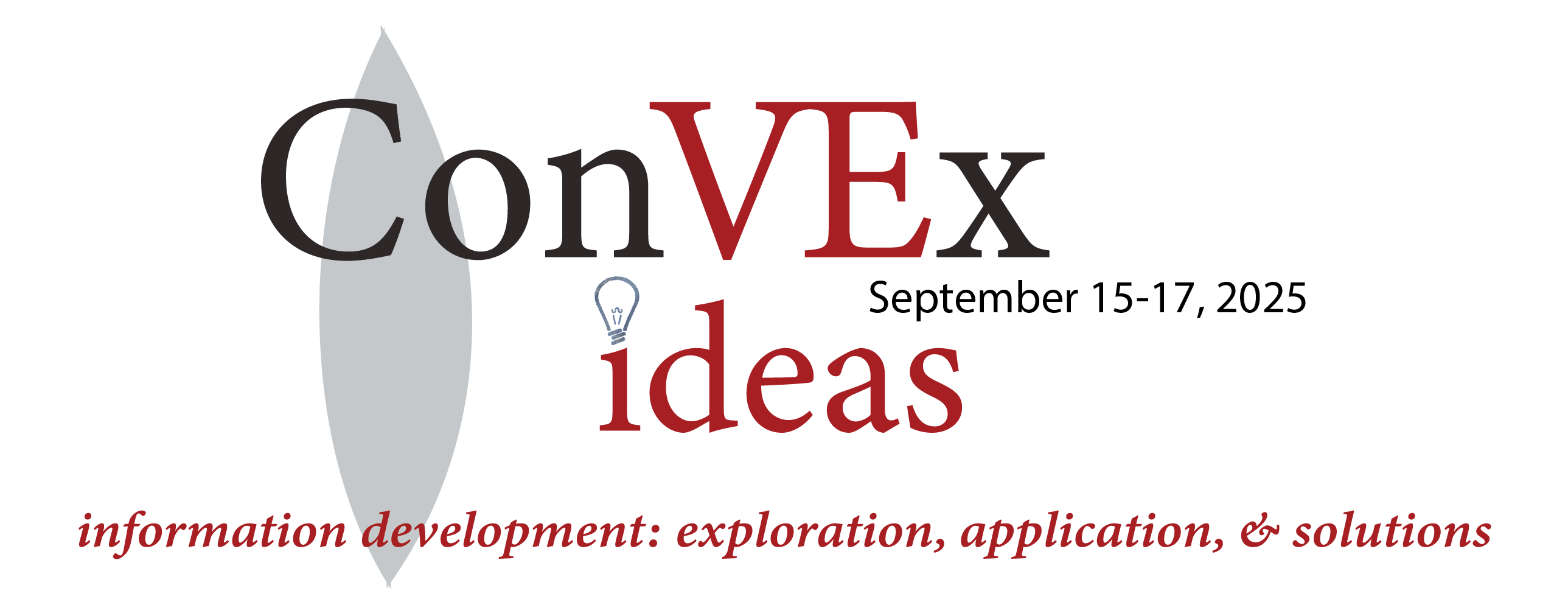Agenda
ConVEx IDEAS is a three-day industry conference that you can attend virtually from the comfort of your own office.
The conference includes an opening session followed by 60-minute concurrent sessions in two tracks.
Join us to learn tips and trends to help you hone your skills.
Using AI in Techcomm: Survey results, insights, and practical applications
 In an effort to bridge the gap between the potential of AI and the specific needs of technical communicators, Cherryleaf conducted two surveys within the techcomm community in both 2023 and 2024. These were designed to uncover the most pressing questions, concerns, and areas of interest related to using AI and ChatGPT in technical communications.
In an effort to bridge the gap between the potential of AI and the specific needs of technical communicators, Cherryleaf conducted two surveys within the techcomm community in both 2023 and 2024. These were designed to uncover the most pressing questions, concerns, and areas of interest related to using AI and ChatGPT in technical communications.
In this session, the findings of the survey are presented and provide valuable insights for technical communicators wanting to know more about the opportunities and potential risks that AI provides.
Additionally, a framework will be offered that attendees can use to identify opportunities and best practices for integrating ChatGPT and AI into their technical authoring processes.
We’ll also demonstrate some practical applications of how AI can help technical communicators:
– From transcript to instructions
– Personalising answers to individual users
– Automating tasks – streamlining documentation updates from Github
By the end of this session you will:
Be equipped with the tools you need to embrace AI technologies as a valuable asset in your role as a technical communicator.
Ellis Pratt, Cherryleaf Ltd

Ellis is a Director at Cherryleaf. He has been working in technical communication since the early 1990s. He is one of the course developers of Cherryleaf’s elearning course on using AI in techcomm. He also presented at AI the Docs 2024 online conference. He hosts the Cherryleaf Podcast. He is also a Member of the Institute of Scientific and Technical Communicators (ISTC), and an Associate of the Institution of Engineering and Technology. He served as a judge for the UK Technical Communication Awards 2020, and the DevPortal Awards 2020 and 2021.
AI Unveiled: A Crash Course for Content Development Teams

AI, ANN, LMM, ML, NLG, NLP, NLU, RAG — and you thought XML was bad! If you’re suffering from AI acronym overload, you’re not alone. Join Content Rules Founder and CEO Val Swisher for a crash course in what these emerging technologies are and what they mean for content professionals. Val will demystify the alphabet soup that is AI. She’ll help you understand your role as both creator and user of this fast-moving technology. And she’ll leave you with some practical tips for how to help ensure that your enterprise AI solution is set up for success.
In this session, you will learn:
– How AI enables machines to emulate human thoughts and expression
– The crucial role of content in training RAG and GenAI solutions
– How to prepare your content to ensure effective results from an AI system
Val Swisher, Content Rules

Val Swisher is the Founder and CEO of Content Rules, Inc. Val enjoys helping companies solve complex content problems. Her customers include industry giants such as Google, Meta, Cisco, Visa, and Roche. Val has been using natural language processing with her customers for more than 16 years. She has written and spoken on AI topics at conferences all over the world. Val believes that knowledge is power and the key to successful AI is understanding how best to harness the technology. She is a well-known expert in content strategy, structured content, and content transformation.
GenAI and You! A review of CIDM’s 2024 benchmark survey on generative artificial intelligence

GenAI and You! A review of CIDM’s 2024 benchmark survey on generative artificial intelligence
Generative artificial intelligence (GenAI) broke through to the masses in 2022 with the promise of revolutionizing many aspects of business, art, and literature. An industry survey conducted by The Center for Information Development Management (CIDM) sought to understand the impact of GenAI in the technical communication industry two years into this revolution.
Join Comtech Services’ Senior Consultants Amanda Patterson and Dana Aubin in this session to learn about the results of the survey including industry trends, approaches, and concerns. We will also present data on how CIDM members compare to the rest of the industry and explore what these results mean for the tech comm field.
Dana Aubin & Amanda Patterson, Comtech Services

Dana Aubin is a Senior Consultant at Comtech Services with almost 20 years of experience in technical writing, content strategy, and information modeling. She is based in Denver, Colorado, and enjoys gluten-free baking, teaching her old dog new tricks, and giving history tours at her local cemeteries.

Dr. Amanda Patterson is an AI enthusiast and accomplished technical communicator specializing in developing technical communication strategies for the manufacturing sector.
Her expertise encompasses leading technical writing teams, enhancing process efficiencies, and implementing advanced software solutions. Additionally, she plays an active role in the Society for Technical Communication (STC) and the Center for Information-Development Management (CIDM), demonstrating her commitment to the field through leadership, conference contributions, and publications.
RAGs to Riches: How Our Content Affects Retrieval Augmented Generation
 LLMs have a knowledge problem: their training data is often out of date, and the info we want to leverage often isn’t included in the training data in the first place. Retrieval Augmented Generation (RAG) is an approach to dynamically give LLMs the information we need them to have right when we need them to have it. Want an LLM to know about your products, procedures, or users? RAG is the solution.
LLMs have a knowledge problem: their training data is often out of date, and the info we want to leverage often isn’t included in the training data in the first place. Retrieval Augmented Generation (RAG) is an approach to dynamically give LLMs the information we need them to have right when we need them to have it. Want an LLM to know about your products, procedures, or users? RAG is the solution.
But how do our docs affect RAG? Our doc content, its formatting, and how it’s processed all impact whether the LLM responds with knowledge and (reasonable) confidence or whether the response is full of hallucinations. Come learn about RAG, how technical communicators can make use of it, how our docs affect RAG performance, and what we can do to make sure our users (and our LLMs) get the content they need when they need it.
Manny Silva, Skyflow

Technical writer by day, engineer by night, and father everywhere in between, I wear many (figurative) hats. I’m passionate about intuitive and scalable developer experiences, and I like diving into the deep end as the 0th developer.
5 Steps to Unlocking the Full Potential of AI

AI is no longer a futuristic concept but a present-day reality that technical communication teams must harness to stay competitive. However, many organizations struggle to realize the full value of their AI investments, often due to a lack of clear strategy and understanding of the implementation process.
In this session, we will explore a five-step approach to value realization from AI applications specifically tailored for tech comm professionals. This approach covers the journey from initial AI adoption to maximizing its impact on content creation, management, and distribution. We’ll cover:
- The critical steps to unlocking AI’s potential: Five key steps that can guide your team from AI adoption to achieving measurable business value.
- How to align AI with organizational goals: How to ensure that your AI initiatives are strategically aligned with your company’s overall objectives, ensuring a higher ROI.
- Integrating AI into existing workflows: Best practices for seamlessly incorporating AI tools into your existing content management systems & processes.
- Promoting a culture of continuous improvement: Fostering a mindset of ongoing learning and innovation to keep pace with the evolving AI landscape.
- Case studies & real-world examples: Successful AI implementations and the lessons learned along the way.
Keren Brown, Zoomin

Keren Brown is the VP of Value and Enablement at Zoomin, where she leads Sales Enablement, Customer Value and Education, Product enablement and adoption, and Marketing. Her expertise lies in maximizing product value, collaborating with product teams, creating effective marketing strategies, and conducting ROI analysis. At Zoomin, Keren helps technical documentation managers articulate the measurable value of their technical documentation to their upper management, and helps them implement GPT solutions for their own knowledge portals.
Forging a Next-Generation Content Lifecycle
 Generative AI (GenAI) is changing the way content teams work. This presentation explores GenAI’s transformative potential to enhance the content lifecycle: from planning and creation to publishing and optimization. By partnering GenAI’s capacities with human elements in each phase of the lifecycle, we highlight how GenAI can elevate the capabilities and enthusiasm of today’s content professionals. However, with benefits come hazards, necessitating caution in implementing and governing new technologies. By outlining a path of intentional integration, we propose a roadmap for using GenAI to maximize technological value while retaining the essential human experience of the elements of content operations.
Generative AI (GenAI) is changing the way content teams work. This presentation explores GenAI’s transformative potential to enhance the content lifecycle: from planning and creation to publishing and optimization. By partnering GenAI’s capacities with human elements in each phase of the lifecycle, we highlight how GenAI can elevate the capabilities and enthusiasm of today’s content professionals. However, with benefits come hazards, necessitating caution in implementing and governing new technologies. By outlining a path of intentional integration, we propose a roadmap for using GenAI to maximize technological value while retaining the essential human experience of the elements of content operations.
Paula Land & Elliott Risch, Enterprise Knowledge

Paula Land is Principal Consultant for Advanced Content at Enterprise Knowledge. Her decades of experience as a consultant and in-house content strategist leading content audit projects lead to the publication of her book Content Audits and Inventories: A Handbook for Content Analysis, the seminal work on this topic. At EK, Paula works on content strategy, content analysis, content governance, and content operations projects for clients in software, manufacturing, telecommunications, and financial services to enable effective strategies that deliver value to end users and ROI to content stakeholders.

Elliott Risch is a Semantic AI Consultant at Enterprise Knowledge. With a background in mathematical logic and formal semantics, Elliott collaborates with academic and enterprise clients to enhance operational efficiency and decision-making capabilities. He has led projects including the implementation of a fully autonomous profit-sharing solution, DARPA-sponsored research into laboratory automation, and semantic layer implementations for financial institutions. Elliott is dedicated to fostering environments that encourage continuous learning and innovation, positioning his clients to thrive in future technological landscapes through sustainable digital infrastructures.
Applying 2024 Benchmarks to Your Content Strategy
 As a tech comm professional how can you apply industry benchmarking data to improve your content strategy? Join our expert panel to unpack the 2024 Technical Content Industry Benchmark Report. This discussion will center on key performance indicators such as traffic, search rankings, engagement, and GPT usage. We will discuss how to integrate the benchmarks from over 60 million user sessions into your content development and management processes, with a special emphasis on how content professionals are leveraging GPT implementations to achieve their goals. Connect with us to shape a more effective content strategy.
As a tech comm professional how can you apply industry benchmarking data to improve your content strategy? Join our expert panel to unpack the 2024 Technical Content Industry Benchmark Report. This discussion will center on key performance indicators such as traffic, search rankings, engagement, and GPT usage. We will discuss how to integrate the benchmarks from over 60 million user sessions into your content development and management processes, with a special emphasis on how content professionals are leveraging GPT implementations to achieve their goals. Connect with us to shape a more effective content strategy.
Rita Khait, Zoomin; Hilary Schuldt, Medidata; Gabrielle Scott, NantHealth

Rita Khait is the Director of Customer Enablement at Zoomin. Since 2022, Rita has been dedicated to empowering customers to gain the full value from Zoomin’s products. This includes leading the company’s online learning academy to equip clients with essential skills for success. Before joining Zoomin, Rita was deeply involved in instructional design and learning content development, leading teams to create impactful e-learning solutions. Her journey in the learning and development field began at KPMG Russia, where she spent over six years shaping learning strategies. Holding an MA in Educational Psychology, Rita combines academic insight with practical experience to deliver.

Hilary Schuldt joined Medidata in 2022 as the Content Strategy Program Manager, where she oversees cross-functional initiatives to support a unified content ecosystem. After earning her PhD in Rhetoric, Hilary taught courses on professional and technical writing at Carnegie Mellon University and seminars on learner-centered design and assessment at Northeastern University. She is fascinated by how human beings make meaning, on knowledge sites and beyond.
 Gaby Scott, Senior Manager of Content Development at NantHealth, began her career writing user guides, has personally seen tech writing teams through two DITA migrations, and has recently dived headfirst into the Pendo.io world of in-app guidance. A strong advocate for the user, Gaby knows the value of seeking out user feedback and behavioral data to guide future content decisions.
Gaby Scott, Senior Manager of Content Development at NantHealth, began her career writing user guides, has personally seen tech writing teams through two DITA migrations, and has recently dived headfirst into the Pendo.io world of in-app guidance. A strong advocate for the user, Gaby knows the value of seeking out user feedback and behavioral data to guide future content decisions.
Writing GenAI-friendly Content
 Writing content for GenAI-based agents such as assistive search, chatbot and so on is different to writing content for human consumption. Given that GenAI systems that are based on Large Language Models are text-hungry applications, we need to prepare content to suit characteristics of these systems. In this talk we shall cover, shifting in technology and behaviour, characteristics of human and GenAI-based system, modern approaches to produce GenAI-friendly content, and best practices. This talk also includes tips on restructuring existing content to cater to a GenAI-based system that can be rolled out on top of your technical documentation.
Writing content for GenAI-based agents such as assistive search, chatbot and so on is different to writing content for human consumption. Given that GenAI systems that are based on Large Language Models are text-hungry applications, we need to prepare content to suit characteristics of these systems. In this talk we shall cover, shifting in technology and behaviour, characteristics of human and GenAI-based system, modern approaches to produce GenAI-friendly content, and best practices. This talk also includes tips on restructuring existing content to cater to a GenAI-based system that can be rolled out on top of your technical documentation.
Dr. Selvaraaju Murugesan, Kovai.co

Selvaraaju (Selva) Murugesan received the B.Eng. degree in Mechatronics Engineering (Gold medalist) from Anna University in 2004 and the M.Eng. degree from LaTrobe University, Australia, in 2008. He has received his Ph.D. degree in Computational mathematics, LaTrobe University. He is currently working as a Head of Data Science at SaaS startup Kovai.co. His interests are in the areas of business strategy, data analytics, Artificial Intelligence and technical documentation.
Balancing Strategy and Tactics for AI Use Cases
 When all those investments in AI and ML finally make their way into your product strategy, everyone’s new top priority is pumping out those features. But these features aren’t like other features, they’re cool features.
When all those investments in AI and ML finally make their way into your product strategy, everyone’s new top priority is pumping out those features. But these features aren’t like other features, they’re cool features.
In this session, we’ll share our experience as a tech comm team on the bleeding edge of delivering generative AI features. Less than a year after Chat GPT was launched, we released the first batch of gen AI features in SAP SuccessFactors HCM. We knew right away that we’d need to treat these features with special care but, not unironically, there were no instruction manuals. We’ll talk about how we got started and who we worked with to build the foundation for responsible AI. We’ll also cover the approach we’re taking to ensure the information experience supports our AI ethics standards and helps build trust and confidence.
Angela Browne & Philip John, SAP

Angela Browne is the VP of User Assistance for SAP SuccessFactors where she leads a global team of content strategists, information architects, and technical communicators. Over the last 5 years, she’s transformed the tech comm role in her organization through investments in content strategy, operations, and data analysis.

Philip John is a people manager at SAP Labs, Bangalore where he leads a team of technical communicators focused on UX writing and product documentation for the Human Capital Management business unit. He also serves as the strategy manager to enhance information development guidelines for all AI-powered innovations in his organization.
Philip has been instrumental in incorporating the technical communicator’s roles and responsibilities into SAP’s AI Ethics Handbook, a comprehensive guide to assist employees in implementing SAP’s AI ethics policy across all stages of the AI product development lifecycle. His dedication to promoting ethical AI solutions has been instrumental in achieving streamlined information development practices in line with SAP’s commitment to building trustworthy AI systems.
Just Write Good: Content Development in the Age of AI
 To be effective, AI systems require enormous quantities of training content. The content needs to be accurate. The content needs to be understandable. And the content needs to be structured. If we fail to pay attention to the quality of the training corpus, the results from the AI will be confusing (at best) and downright inaccurate (at worst). We have all heard the horror stories of AI hallucinations. Quality content has never been more important.
To be effective, AI systems require enormous quantities of training content. The content needs to be accurate. The content needs to be understandable. And the content needs to be structured. If we fail to pay attention to the quality of the training corpus, the results from the AI will be confusing (at best) and downright inaccurate (at worst). We have all heard the horror stories of AI hallucinations. Quality content has never been more important.
In this session, you will learn:
– The importance of content quality for effective RAG and GenAI
– The role of persistent content vs transitory content
– How to write effectively in the age of AI
Regina Lynn Preciado, Content Rules

Regina Lynn Preciado is the Senior Director of Content Strategy Solutions at Content Rules. She leads content strategy teams to help our customers adopt structured content successfully and to prepare their content for AI. Whether the business objective is to reduce risk, streamline process, deliver personalized experiences at scale, or implement AI solutions, Regina has helped organizations of all sizes achieve their content reuse and automation goals. She lives a dogspotting lifestyle.
Model Content for Model Training
 At Intuit, our self-help content is used to fuel our AI model’s responses. Our content is not structured. When GenAI came onto the scene we started experimenting with how to structure and tag our content so we can get better responses from the model. Our journey is far from over, but this presentation covers the different iterations we have been through to date, the methodology we are using to measure our results, and the challenges we have faced along the way.
At Intuit, our self-help content is used to fuel our AI model’s responses. Our content is not structured. When GenAI came onto the scene we started experimenting with how to structure and tag our content so we can get better responses from the model. Our journey is far from over, but this presentation covers the different iterations we have been through to date, the methodology we are using to measure our results, and the challenges we have faced along the way.
Beth Hettich, Intuit

Beth is a content design manager at Intuit. Her team is responsible for the self-help content for the QuickBooks ecosystem of products. This includes point-of-need assistance as well as self-help content that is available on quickbooks.intuit.com and within the products themselves. Prior to Intuit, she worked at IBM as a Content Architect and Strategist. She lives in Tucson, AZ with her husband and two teenagers.
Implementing Prompt Operations to Align AI with Your Content Strategy Goals
 Session Overview: In this one-hour session, I will guide attendees through the process of creating and implementing a Prompt Operations Plan to streamline and optimize their use of generative AI in technical documentation. Drawing from my recent course, “Structuring Prompts for Technical Communication & Content Development” I will share practical strategies and real-world examples to help teams develop a comprehensive plan that aligns with their specific goals and objectives.
Session Overview: In this one-hour session, I will guide attendees through the process of creating and implementing a Prompt Operations Plan to streamline and optimize their use of generative AI in technical documentation. Drawing from my recent course, “Structuring Prompts for Technical Communication & Content Development” I will share practical strategies and real-world examples to help teams develop a comprehensive plan that aligns with their specific goals and objectives.
Key Takeaways: Understanding the key components of a Prompt Operations Plan, including prompt libraries, development cycles, and performance metrics. Strategies for securing team buy-in and assigning leadership roles to ensure successful implementation and adoption of the plan. Techniques for defining clear objectives and scope for AI-assisted content creation, ensuring alignment with broader content strategy goals. Best practices for continuous integration and improvement of the Prompt Operations Plan, including regular updates to prompt libraries and ongoing performance monitoring.
Session Format: The session will be a combination of presentation, interactive worksheets, and group discussion. Attendees will have the opportunity to begin drafting their own Prompt Operations Plan during the session and receive feedback from peers and the presenter. Relevance to Conference Theme: As more technical documentation teams incorporate generative AI into their workflows,
Lance Cummings, University of North Carolina Wilmington

Lance Cummings is a professor of English in the Professional Writing program at the University of North Carolina Wilmington. Dr. Cummings explores content and information development in technologically and culturally diverse contexts both in his research and teaching. His most recent work looks at how to leverage structured content with rhetorical strategies to improve the performance of generative AI technologies and shares his explorations in his newsletter, Cyborgs Writing.
Practical AI Applications for Technical Documentation Teams Today and Tomorrow

Scott Abel, The Content Wrangler, leads a panel discussion on the practical applications of AI in technical documentation teams. This session brings together a diverse group of participants, including practitioners, educators, consultants, and software makers, who will share their real-world experiences and insights.
Explore how AI is transforming documentation processes, improving efficiency, and enhancing content quality. Gain valuable knowledge on implementing AI tools, overcoming challenges, and the future of AI in the industry. Come prepared to ask questions of the panel.

Scott Abel, The Content Wrangler: Scott Abel is a Content Strategy Evangelist at Heretto, CEO of The Content Wrangler, and an expert in technical communication management. He is an advocate for structured content and intelligent content strategies, which involve using standardized methods and technologies to produce and manage content more efficiently. He was recognized as a Fellow in 2021, which is a significant honor awarded to those who have made notable contributions to the field of technical communication.
Abel also hosts webinars, interviews industry movers and shakers, writes for industry pubs, authors and publishes a series of content strategy books, mentors students, speaks at events globally. He is a member of the board of advisors for the University of California Santa Barbara Extension Professional and Continuing Education Customer Experience Certificate Program and has served as a lecturer at the University of California Berkeley School of Information.
 Melanie Davis, Reltio: Melanie Davis is a passionate professional communicator specializing in technical data transformation and content curation. She is a long-term industry veteran with experience as a technical writer, editor, localization coordinator, project optimizer, and content technology and system architect. She has a solid reputation for instituting and enhancing lightweight and effective project process and product documentation, which she is currently exercising as Sr Manager, Content Tools and Technology, at Reltio.
Melanie Davis, Reltio: Melanie Davis is a passionate professional communicator specializing in technical data transformation and content curation. She is a long-term industry veteran with experience as a technical writer, editor, localization coordinator, project optimizer, and content technology and system architect. She has a solid reputation for instituting and enhancing lightweight and effective project process and product documentation, which she is currently exercising as Sr Manager, Content Tools and Technology, at Reltio.

Lance Cummings, University of North Carolina Wilmington: Lance Cummings is a professor of English in the Professional Writing program at the University of North Carolina Wilmington. Dr. Cummings explores content and information development in technologically and culturally diverse contexts both in his research and teaching. His most recent work looks at how to leverage structured content with rhetorical strategies to improve the performance of generative AI technologies and shares his explorations in his newsletter, Cyborgs Writing.

Jason Kaufman, Irrevo: Jason Kaufman is a renowned Content Strategy Expert and the President of Irrevo (a technical writing staffing and consultancy), with over 20 years of experience in enhancing customer satisfaction and reducing support costs for leading organizations. Passionate about AI-driven technologies, he revolutionizes organizations’ approaches by leveraging innovative content strategies. As a visionary, Jason collaborates with enterprises, specializing in AI integration, knowledge engineering, and content management. His expertise spans writing, reviewing, summarizing, and analyzing content using AI. With KCS and AI for Decision Making certifications, he combines technical writing, leadership, and cutting-edge AI solutions for lasting positive impacts on companies and customers. He is also the publisher of EverythingAI news, check out EverythingAI on LinkedIn: linkedin.com/newsletters/7054141840194764800/.
 Dave Ingram, Medallia After freelancing for various publications since 2009, Dave found his niche in technical writing in the software industry. As a Certified Professional Technical Communicator (CPTC), he thrives on finding creative ways to craft effective user guides, API documentation, instructional videos, and more. These days, Dave is focused on discovering how generative AI can reshape the way information is organized and presented for maximum impact.
Dave Ingram, Medallia After freelancing for various publications since 2009, Dave found his niche in technical writing in the software industry. As a Certified Professional Technical Communicator (CPTC), he thrives on finding creative ways to craft effective user guides, API documentation, instructional videos, and more. These days, Dave is focused on discovering how generative AI can reshape the way information is organized and presented for maximum impact.
 Dominik Wever, Promptitude: After running a successful CRM software company for 19 years, I’m now focusing on what I love most: Making software and AI accessible to help businesses thrive around the globe.
Dominik Wever, Promptitude: After running a successful CRM software company for 19 years, I’m now focusing on what I love most: Making software and AI accessible to help businesses thrive around the globe.
Template
Abstract

Presenter, Company

Presenter Bio Coming Soon
